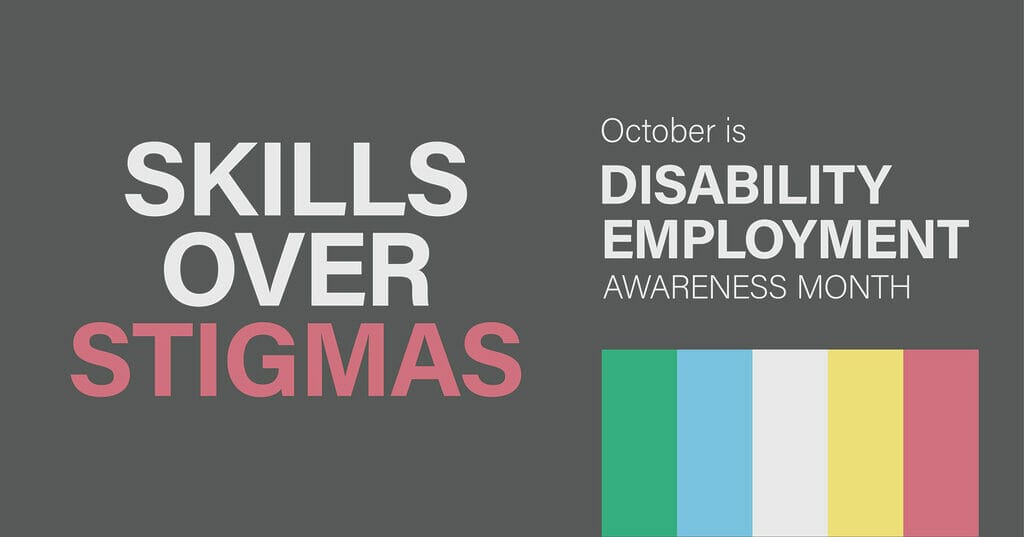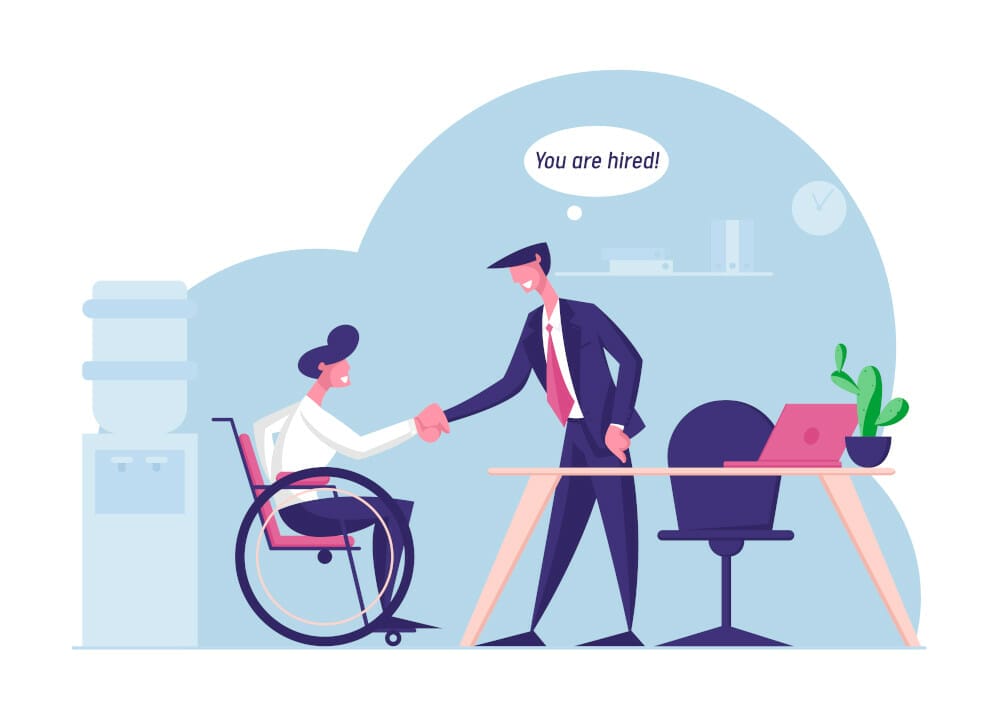
Written for The Alycia Anderson Company by Lilly Grossman
October is National Disability Employment Awareness Month (NDEAM). The concept of NDEAM was created to raise awareness of the systemic challenges that people with disabilities face in gaining employment. The belief that people with disabilities are somehow less than, unworthy, and/or a burden on society is unfortunately a prominent one. Society’s attitudes about people with disabilities make awareness months, such as NDEAM, overtly necessary.
Hard truths and stark realities
According to the United States Department of Labor, people with disabilities currently have unemployment rates of 7.4% for ages 16+ and 7.9% for ages 16-64, compared to 3.8% of non-disabled people in both age groups. There is a very apparent gap between those two statistics which should not be there.
So why is the gap there?
As a person with a disability, you have to learn how to navigate a society that was not built with you in mind. You have to fight to be seen, to be heard, and have to continually prove yourself to everyone just to be taken seriously. When you are living with a disability, it sometimes seems that we have to beg the non-disabled people around us to treat us like human beings.
When someone is born with or acquires their disability early on, oftentimes the only option forward for parents or the individual is through government entities and assistance. This can be true for newly disabled adults as well. The burden of proof required by these agencies is daunting to say the least. The result almost always ends up leaving you feeling shame, less than, or even questioning your worthiness or entitlement to the funds placed into law primarily for the case of you.
Tough choices and immeasurable odds
People with disabilities often have to choose between receiving government assistance and being independent and successful because there is an income limit. This basically forces them into poverty or leaves them living on a virtual cliff where one wrong move will place them in a very bad situation. The health insurance benefits of living on government assistance are worth more than gold and what is offered by most employers does not even come close.
As a person with a disability myself, it can feel like we essentially need a full-time consulting staff or be a multi-field law professional to understand and navigate the resources available to us. When you consider all of the other things that people with disabilities have to live with, deal with, and go through on a daily basis, it is not fair to put that on us.
We have to balance “normal” adult life and our health. For those of us with physical disabilities, we have to maintain our equipment and check our air pressure, on top of brushing our teeth and combing our hair.
We must muster the strength, courage, and gumption to face another day in a society that often disables us more than our own actual disabilities disable us.
We constantly live with the fear that people may be talking behind our backs or to our faces, downplaying our abilities, and belittling us. Because of this, we must muster the strength, courage, and gumption to face another day in a society that often disables us more than our own actual disabilities disable us.
As a young adult with a disability trying to find my way, I can only imagine what it feels like for an older adult with a newly acquired disability having to figure all of this out, while also dealing with the transition to a new way of living.
We are also made to feel like we cannot change our mind when it comes to our career goals. How are we supposed to know from the start what we want as a career when some of our non-disabled peers are still figuring it out for themselves too, as we grow up in a world that is still learning how to be fully inclusive? It often seems like there is no room or time for trying different things because that is seen as a waste of money and resources.
The art of survival
In regards to the disability community, our world is still learning that it is acceptable to request extra time on tasks in order to be able to do them to the best of our ability. The norms of our demanding society–do things faster, quicker, more efficiently–this can be quite detrimental to the disability inclusion movement when people are solely focused on finishing the work.
We have to spend years figuring out how to maintain our health and ultimately not focusing on anything else because of it. Work, school, and social activities get pushed to the side if we are solely focusing on how to survive, but the constant work of survival leads to a broader education and the work of survival is truly vital work in itself.
For companies who are bold enough to allot the time, space, and resources for disability inclusion in the workforce, they are finally starting to understand and discover why this work is so key. They are realizing that it is valuable because including disability translates into new found innovation, creativity, and solutions.
We deserve to be paid fairly, but constantly undervalue ourselves because society perpetuates the idea that people with disabilities are less than. The fact that people with disabilities are undervalued when they often provide more thoughtful, considerate, inclusive, and well-rounded solutions than many non-disabled people is absolutely paradoxical.
Full disclosure and accommodation
We have to find a balance between working forty hours a week to receive full-time benefits, such as health insurance and a 401k, and having limited energy. It is difficult for some of us to work a full forty hour week due to chronic fatigue, chronic pain, or other invisible health conditions that can take up much of our brain power. We might need to work thirty or thirty-five hours a week. As long as we get our work finished, we should not be penalized for not being at our desk for eight hours a day.
If we have trouble speaking due to our disability, we do not have the luxury of not disclosing our disability in a job interview. The second we get on the phone, the interviewer knows and possibly judges our abilities because of it. I know this is certainly the case for me. I am very eloquent over written communication, but once I start speaking, all of my eloquence flies out the window.
And we are expected to do all of this with a smile on our face while being so grateful and not getting burnt out because “people with disabilities have equal rights under the law.”
It should not be like this.
Disability and a Global Pandemic
Employers, there was a global pandemic and the world essentially shut down for two and a half years. Here is why you need to take this into consideration:
- For people with health conditions, many of us are still being careful.
- Some people–myself included–did not get the chance to even enter the workforce prior to COVID.
- People with disabilities can be prevented from simultaneously attending school full-time while also working full-time.
We can be forced to choose one or the other and can end up feeling like we fell behind, regardless of our choice.
Office, Remote or Hybrid?
In addition, a lot of big companies are now starting to mandate in-person work. Here is why this is detrimental for people with disabilities:
- Eliminating remote or hybrid work options erases the essential flexibility for this population in order to balance work, doctor’s appointments, childcare, household tasks, and a social life.
- It also ultimately cuts off a whole population of talent.
Increasing disability awareness in employment can positively shape our work environment for all people. Employee benefits, such as paid time off, sick days, vacation days, retirement plans, and health insurance help everyone involved, not only people with disabilities.
Source: Mercer and Global Disability Inclusion, LLC
Our place in DE&I
Disability has been traditionally left out of Diversity, Equity & Inclusion (DEI) conversations. Here is why disability is beginning to be brought into these conversations:
- People with disabilities make up the world’s largest minority group and are the most underrepresented population in all facets of society.
- People with disabilities have incredible consumer power accounting for over one billion strong globally.
- Disability is the only minority population that you can join at any time.
Disability does not discriminate, however, society does.

Find your power
Fellow people with disabilities, we must stop accepting that we deserve less because of our disability. Here are some tips to consider:
- We deserve to be treated equally and fairly.
- We can utilize our networks to find the jobs we deserve.
- We are the disability experts companies SHOULD hire.
- We must keep advocating for disability inclusion.
Life with a disability is all about figuring things out. Together, we will figure out how to harness our undeniable power to accomplish our goals, dreams, and aspirations.
About the Author:

Lilly Grossman is a creative and passionate professional focused on spotlighting advocacy and Diversity, Equity and Inclusion (DEI). She holds a Bachelor of Arts degree in Political Science with a minor in English from Whittier College. As a young woman with a physical disability, Lilly utilizes her personal and professional experiences to empower and uplift others. She has held internships with the Undiagnosed Diseases Network Foundation (UDNF), Disability:IN, Global Genes, RespectAbility, and Illumina, where she developed her skills in digital marketing and communications. She enjoys writing and spending time with loved ones.